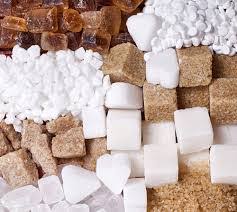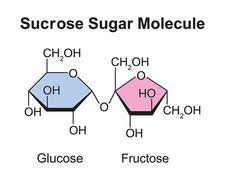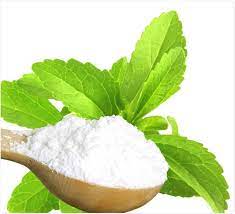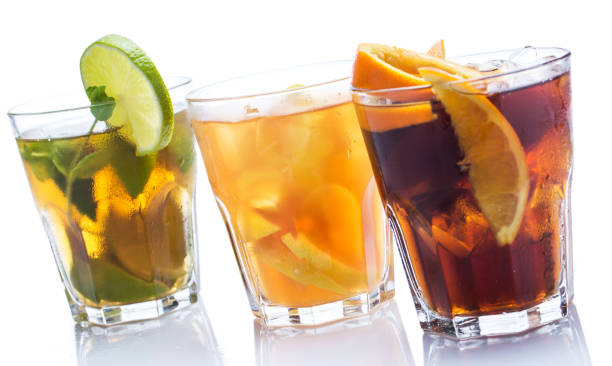Greetings to all fans of sensible eating. Today, we take a look at a slightly controversial topic called “sugar – the white killer” and try to make some amends to this criminal.
However, we won’t dwell too much on well-known and documented facts such as the high glycemic index or the virtually zero content of health-promoting substances such as vitamins and minerals. We will compare sugar with other sweet ingredients that we often use as “healthy” sugar substitutes.
It may be best to answer some of the most common questions and doubts we hear about sugar.

Beet versus cane
Is sugar really so evil for our bodies? And why wasn’t it figured out earlier, when sugar, i.e. sucrose, has been used by mankind for several thousand years. And now I hear the first voices of resistance. Yeah yeah, mankind may have been sweetening with sugar for thousands of years, but it’s the healthier cane sugar, not our beet killer. Here we need to eradicate a very widespread myth. In fact, sugar beet and sugar cane contain exactly the same sucrose molecules. In other words, beet and cane sugar are exactly the same. The healthy brown colour in quotes is only due to the less than perfect cleaning of the cane sugar during its production. After all, even on the packaging of cane sugar we can easily read that it contains 98-99% sucrose. In the rest are simple sugars from molasses, a little caramel and ashes. Sometimes one reads how healthy molasses is. But we have to remember that cane sugar really only contains a small fraction of it, and if we wanted to be healthy by eating cane sugar molasses, we would have to eat it by the pound, and that, as you will admit, is not the way to a healthy life …
“That’s impossible, the brown one is less sweet”, argues another cane confectioner. This feeling is mainly caused by the brown “healthy” colour (our eyes convince our brain of anything) and the presence of a little caramel produced when the molasses is thickened. The other 99% sweetens and works in our body just like our beet (in)friend.
Believe me, if you pay 60 CZK for ½ kg of cane sugar with the idea that you are doing something extra for your health, you are just generously sponsoring the importers and sellers of this “brown gold”. On the other hand, feeling good is often priceless…

I believe that this clears up the cane vs. beet issue. It’s also clear to me that I’ve just lost a significant portion of my readership. It is said that the truth will get you the farthest, but no one can tell you how long the journey actually takes 😊.
What do the studies say?
But at least for a moment on the question of the effect of sugar on our health. A 2015 meta-analysis (statistical evaluation of a large number of individual studies on the topic) showed. That the normal consumption of sugar has no effect on human health. Of course, the same analysis confirmed that excessive sugar consumption causes a number of serious health problems (mostly related to obesity).
So, is sugar sweetening in a reasonable amount really a major risk? In my opinion, using sugar for cooking, baking, preserving, sweetening tea, etc. is perfectly fine as long as we keep our sugar consumption, or rather simple carbohydrates, to something like 60-80 g/day. In that case, I wouldn’t worry about sugar at all.
Honey, dates or chicory
We sweeten with honey and date paste anyway. That’s much healthier.” I hear this argument quite often too.
Let’s say a little healthier. Honey certainly contains a significant amount of health benefits, but in terms of calories it is very similar to sugar. Date paste has a certain fibre content. Calorically, it is virtually identical to sugar (if you subtract the water content of honey and date paste). Moreover, the glycemic index of all 3 sweeteners is very similar. So will I be less at risk of obesity if I replace all the sugar in my diet with date paste or honey? Absolutely not.
I almost forgot about another hit of today’s healthy kitchens – chicory syrup. I have nothing against chicory, but take a good look at what’s actually sweetening in your syrup. Usually there is some sort of intense sweetener like stevia or sucralose because the syrup itself contains very low amounts of carbohydrates. You can read somewhere that chicory stupa contains the sweet soluble fibre inulin. I would order the perpetrators of such articles to sweeten the year with pure inulin only. It wouldn’t be a sweet year at all. Thus, the consumer does not sweeten with chicory, but with an intense sweetener dissolved in chicory syrup. Well, it’s his choice.

Artificial sweeteners and sugar polyols
Well, artificial sweeteners? People often do not distinguish between intense sweeteners such as Sucralose, Saccharin, Aspartame, Acesulfame K or the now very popular natural Stevia and the so-called “sweeteners”. sugar polyols such as maltitol, sorbitol, xylitol, erythritol, etc. The former are highly intense and sweeten at very low amounts, so for sugar-free baking, something else must be used in the buns and cakes to create the so-called body of the product. These are the polyols, which have a lower caloric value and are less sweet compared to sugar, but due to their lower digestibility and their subsequent fermentation by bacteria in the colon, they cause certain negative physical symptoms (bloating or outright diarrhea) when consumed at higher levels. Moreover, they are all chemically modified derivatives of starches, so they are much worse than sugar in terms of our carbon footprint. For example, xylitol is so energy-intensive to produce that for a long time it was produced only in China, where they don’t care so much about these little things… I would definitely choose sugar here too. Of course, sugar-free products have a justification in the diet of diabetics, but I would not recommend them for the rest of the population.
Hidden added sugar
ATTENTION! But I forgot one very important thing. The biggest risk is the hidden overconsumption of sugar, especially in sodas and juices. I expect some sugar from a bun or a candy. But there’s a hell of a lot of it in lemonade or juice, and they’re really easy to drink. A lot of us know that Coke, Fanta, Sprite and all similar goodies have about 10% sugar, which is 20 bones (20 x 5 g) in each litre, but it’s very similar with juices. There may often be no added sugar, but there are so many simple sugars in concentrates (often directly from the fruit used) that one would be surprised. And for those who drink Tonic, I can tell you that it also contains 7-8% sugar. So whoever replaces these drinks with water will not fail. The same applies to flavoured yoghurt, flavoured yoghurt milks and so on. There, the health benefit is much higher than with lemonade due to the milk component and lactic acid products, but unsweetened versions of dairy products are still a better option.

To eat (it) or not to eat
For me, it’s pretty clear. If I sweeten my tea or coffee with a teaspoon of sugar or have one sugar-sweetened cake after lunch, I certainly won’t hurt myself. If someone feels better if they sweeten their drink with honey, chicory or date, I won’t argue with them at all. It won’t be that much healthier, but in the end it’s our free choice. Only we shouldn’t whine that those nasty food and drink manufacturers are harming us and ruining our health. Just stick to the well-known saying – everything in moderation. Then even sugar can become our friend again.
So write, respond, discuss, let’s get this sugar thing sorted out once and for all. 😊

